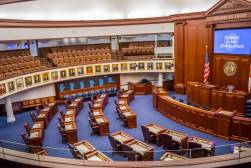Minnesota Senate passes bill proposing $10 million to troubled licensing system

The Minnesota Senate approved a $10 million emergency appropriation on Monday that would allow contractors to continue working on the state’s troubled vehicle licensing and registration system.
With a 47-20 vote, the legislative body passed SF 3267, which proposes shifting funds from other programs so that critical repairs to the Minnesota Licensing and Registration System (MNLARS) can continue. The Senate bill would allocate the funding to the commissioner of the Department of Public Safety, who must also choose reductions from other general fund appropriations other than those relating to client-facing healthcare, corrections, public safety, mental health programs or “other services that are provided directly to the public.”
The bill would fill part of a request by Minnesota IT Services made in January for $43 million to repair and add functionality to a computer system that went online in July and soon exhibited widespread bugs. Contractors were notified earlier this month that funding would run out by the end of March and that work would be discontinued without further funding, leaving the state’s computer system in a state of disrepair.
A Minnesota House companion bill, HF 3147, which was approved hours after the Senate bill’s passage, varies in approach, but Sen. Scott Newman, chair of the Senate’s Transportation Committee and bill sponsor, says he’s confident a quick agreement will be reached, according to the Associated Press.
The troubled system has caused widespread problems since its launch last year, prompting the hiring of a new IT director to fix the system, the firing of an administrator who helped design the project, and calls from the legislature to dissolve the technology office as a central authority in the state.
By some accounts, the system’s shortcomings have generated $25 million in lost revenue for deputy registrars offices that were not able to conduct business when the system did not work properly.






